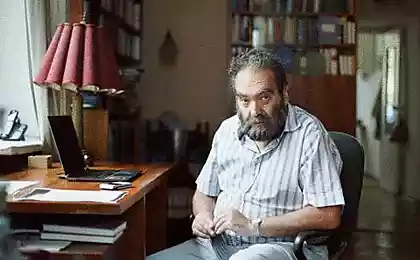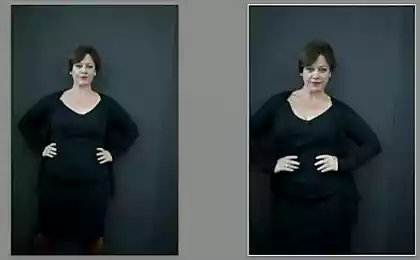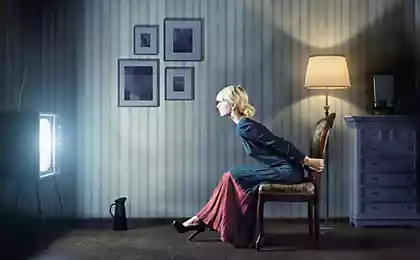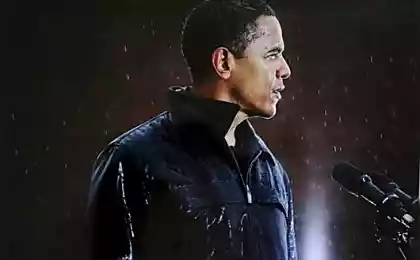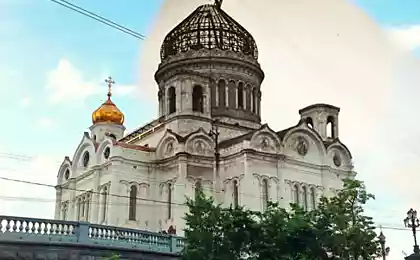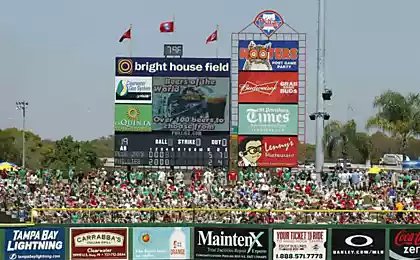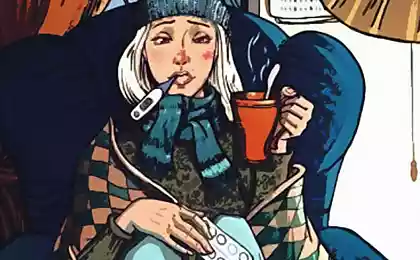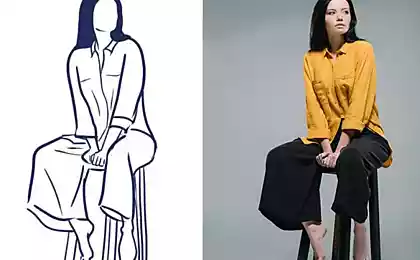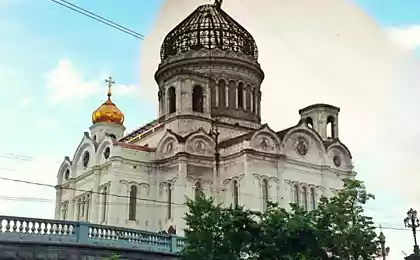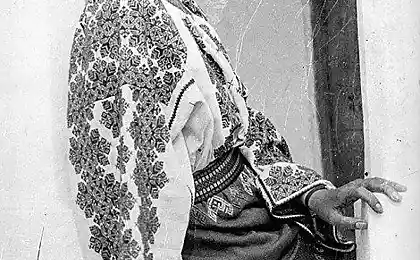690
History in photos (15 photos)
55 years ago, June 15, 1953 builders Hospital Friedrichshain in East Berlin refused to go to work, declaring the strike. The workers demanded the abolition of the increase of the daily output. On June 16, in the rumor spread that the police take the construction site of the hospital. Builders from different places in Berlin, united in large colonies, went first to the building trade unions, and then to the Ministry of Industry.
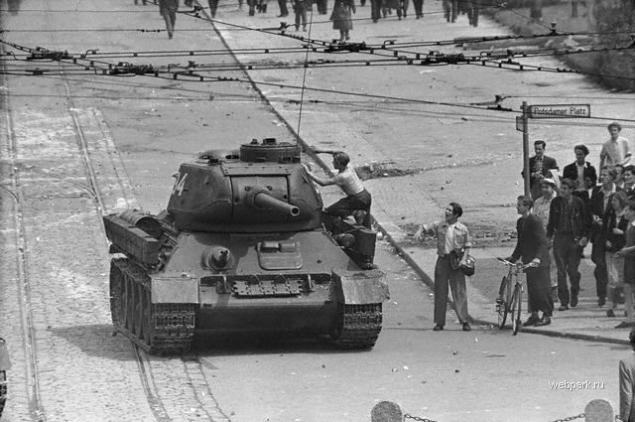
Released to the workers return to the previous minister to communicate performance standards, but there are few who listened - at the rally began to act speakers who have put forward political demands: the unification of Germany, free elections and the release of political prisoners. The crowd gathered demanded the First Secretary of the Socialist Unity Party Walter Ulbricht, but he did not come. Workers moved to the area of Stalin Allee, where to build luxury villas for new party bosses. The demonstrators fought off the police one of the cars with loudspeakers and began using it to call people for a general strike. On the morning of June 17 Square Shtrausberger rallied for about ten thousand people. Slogans of the demonstrators were: "Down with the government! Down with the People's Police! "" We do not want to be slaves, we want to be free! "The crowd began to destroy police stations, buildings, party and government organs, burning kiosks Communist newspaper, the symbols of the communist regime. Thus began the famous Berlin uprising in 1953
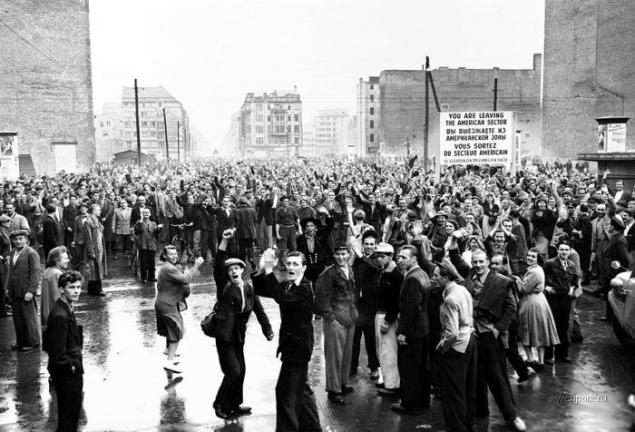
The causes of the crisis in East Germany the most ordinary - Ulbricht government decided to build the country's so-called "Socialism" on the Soviet model. "Accept - decided" and the state machine has earned: the example of "big brother" of the peasants began to forcibly driven into agricultural cooperatives (collectivization), industrial workers began to regularly increase the standards and fined for the slightest offense, reduced wages. "The country is building a socialist future!" Not uchityvalost any location of the country, nor the mentality of the Germans nor the real possibilities of industry in the war-ravaged country.
Increased recruitment of young people in the police barracks, and violates the principle of voluntariness. Collection of taxes from private enterprises and farmers accompanied by coercive measures, up to attract defaulters to justice. On the basis of the law "On protection of public property", thousands of people were arrested and convicted for 1-3 years for the slightest violation of the law. For various forms of faults in the first half of 1953 has been convicted 51,276 people. Traditionally, the Communists pressed church administrative measures.
The Germans responded to the mass exodus to the West. During the first half of 1953 from the GDR fled 185,327 people. Policy bans and violence has led to disruptions in the supply of the population with food, daily necessities, fuel and energy. April 19, 1953 increased the price of products containing sugar.
Events in June 1953 was a natural reaction to all of the above.
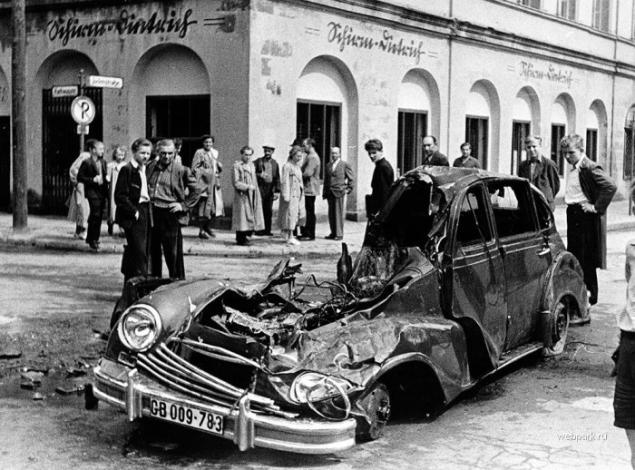
By the evening of June 17 was destroyed building of the Ministry of Industry, the top leaders of the party, which had almost ended up in the hands of the rebels, hastily evacuated under the protection of Soviet military garrison in Karlhorste. The city was completely in the hands of protesters. Very quickly, the uprising spread to the entire territory of the Republic. In factories organized strike committees, exciting newspaper offices, the building of the local committees of the SED. Underwent the siege and storming of hundreds of buildings of state bodies, prison ministry building security and police ministry. It was released about 1,400 people. According to official sources, killed 17 and wounded 166 SED functionaries. In the excitement attended by 3 to 4 million East Germans.
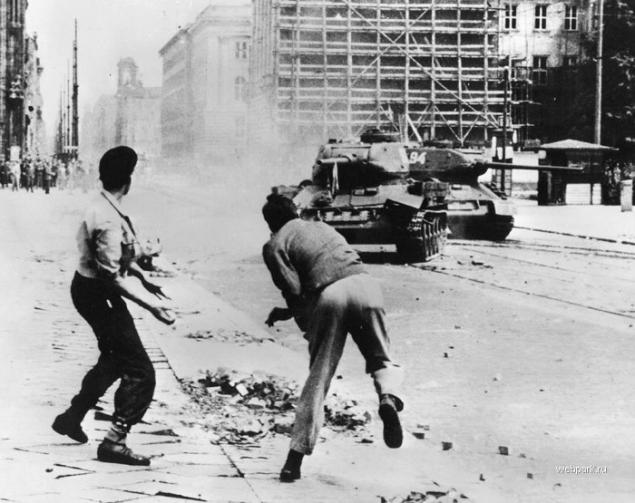
To save his desperate situation, GDRs party leadership turned to the Soviet military command. The fundamental decision on military intervention was made in Moscow on the evening of the 16th day. On the territory of the GDR were by this time about 20,000 Soviet troops. In Berlin urgently arrived Beria.
Against protesters moved Soviet tanks and units of so-called "People's Police". Emergency was declared. The crowd of demonstrators who tried to throw stones and break tanks antenna opened fire. Demonstrators clash with Soviet forces and the police continued until the evening of 17 June, and the next morning started again. In Berlin shot until 23 June.
According to official statistics in 1953 killed 55 people, including 4 women and 6 teenagers from 14 to 17 years. 34 people gunned down in the streets, 5 were executed by the Soviet occupation administration, the two executed GDR authorities. By the authorities killed 5 people.
In 1990, declassified documents, which showed that the victims were two times more - about 125 people. It turned out that the supreme military commissars received from Moscow indication indicative shoot at least 12 instigators of the publication of their names in the press. The first was shot by 36-year-old artist Willie Gettling, father of two children. Now modern German researchers say that the scale of repression was relatively small, considering what forces were thrown by the Soviet leadership to suppress the uprising.
Rise of the pretty scared Moscow and made even stronger position Ulbricht - he has purged the ranks, got rid of the opposition party to govern the country became more tightly. June 21 canceled the decision to return the old work norms, then raised the price of food. In 1954, the Soviet government abolished the regime of occupation and the GDR won sovereignty. Berlin rebellion in 1953 was the first popular uprising in the countries of the socialist camp, which was suppressed by military force.
"The rebels became clear that they were left alone. There were deep doubts about the sincerity of Western policy. The contradiction between the big words and small deeds remembered everything and benefited from the powers that be. Eventually people began to settle down as they could "(Willy Brandt, former Chancellor of Germany)
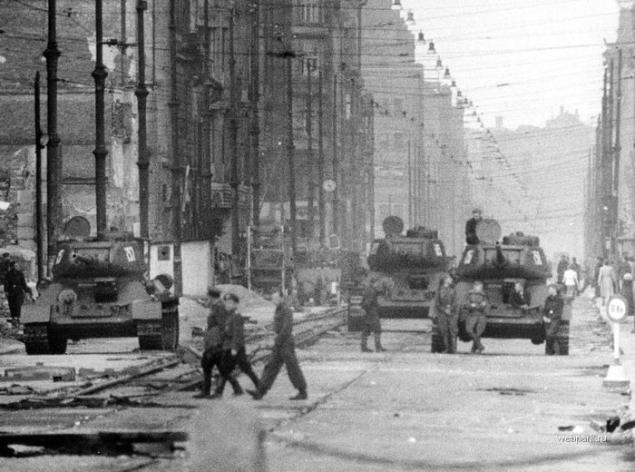
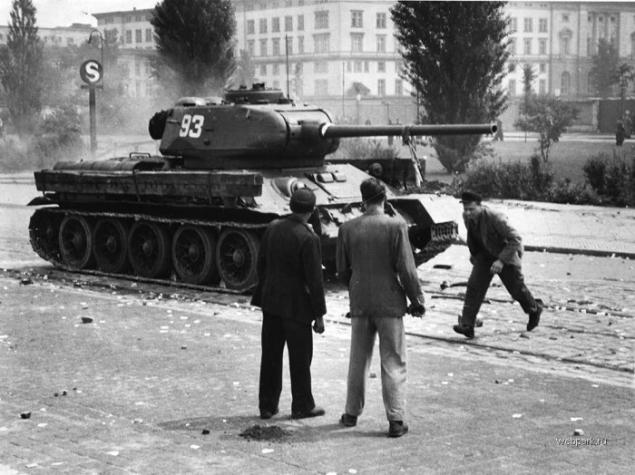
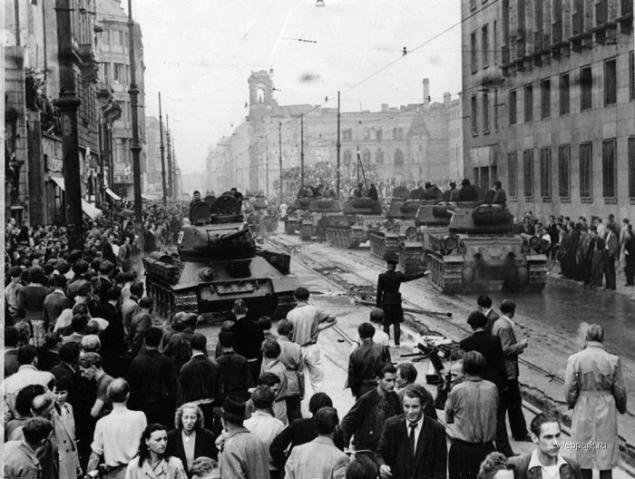
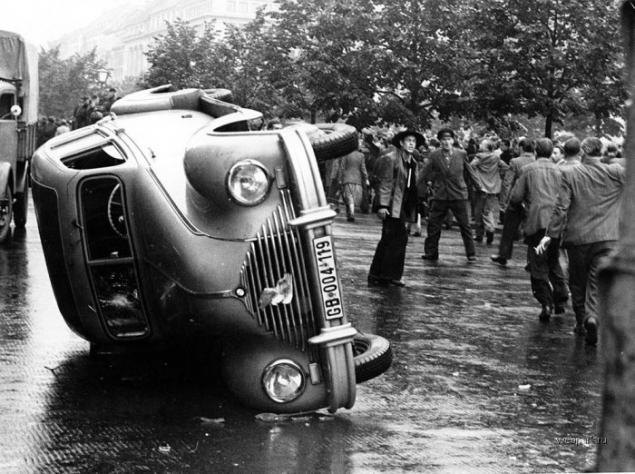
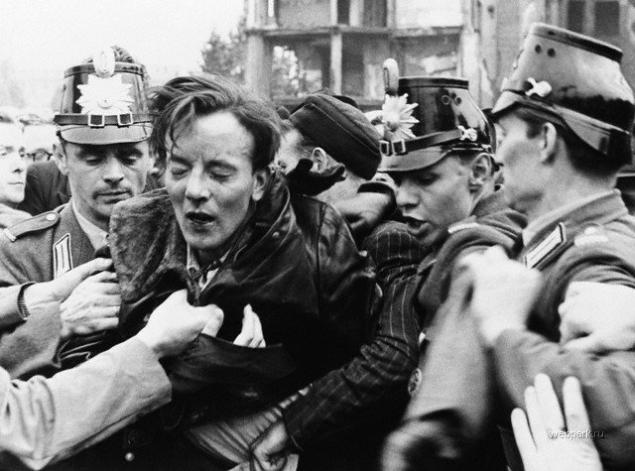
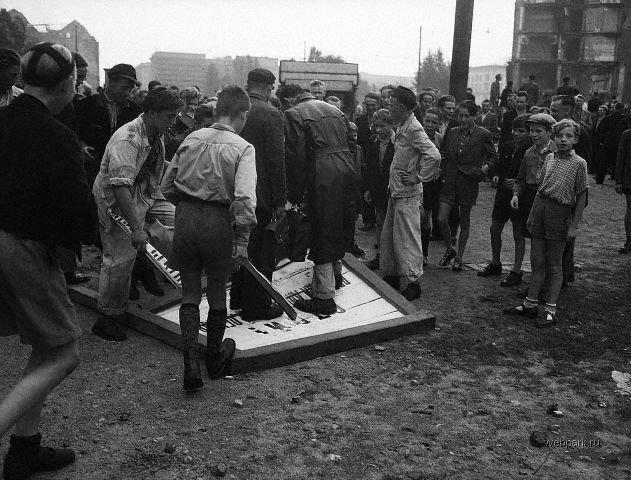
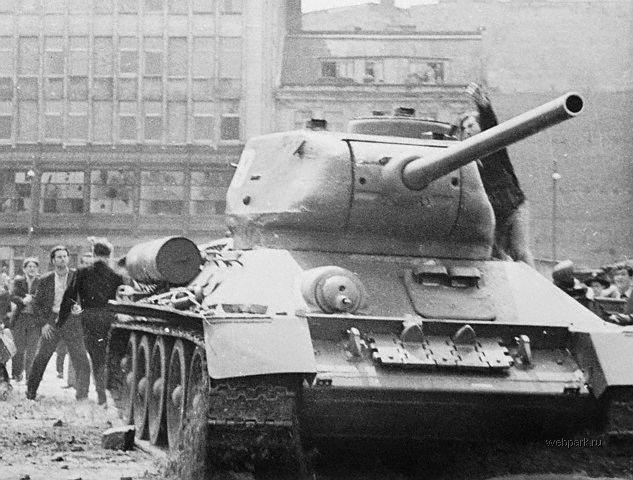
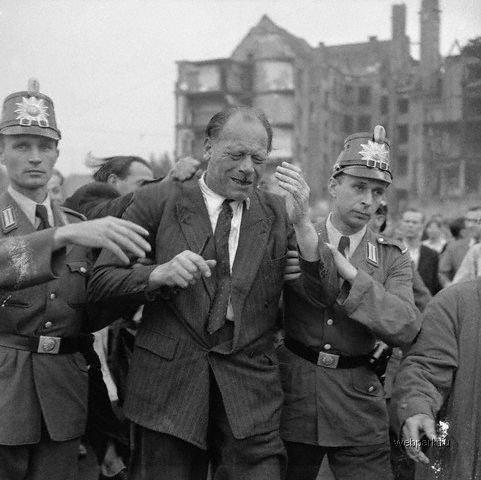
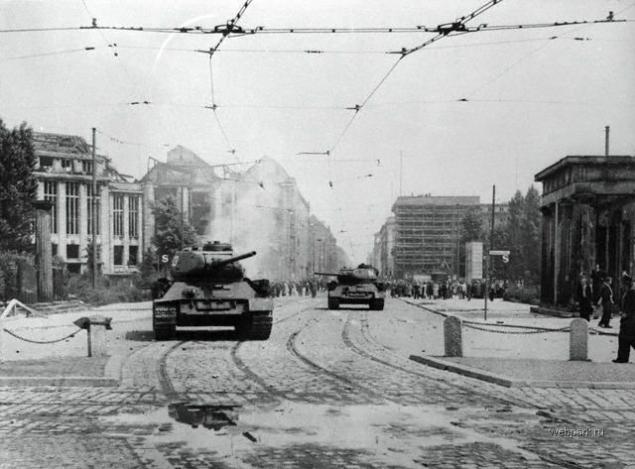
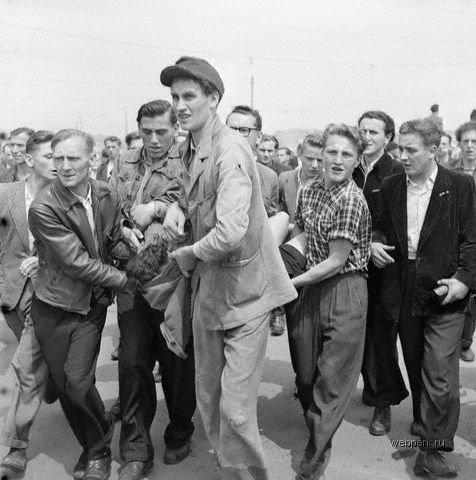
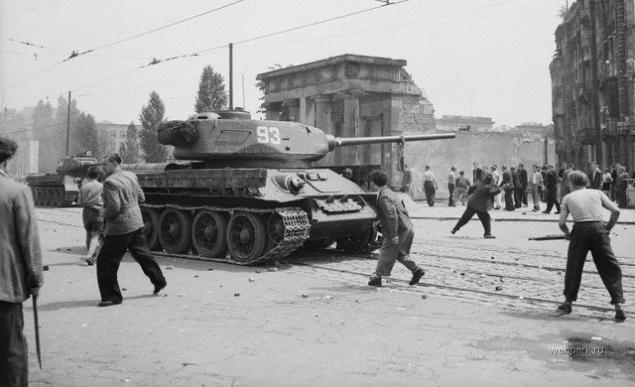
drugoi

Released to the workers return to the previous minister to communicate performance standards, but there are few who listened - at the rally began to act speakers who have put forward political demands: the unification of Germany, free elections and the release of political prisoners. The crowd gathered demanded the First Secretary of the Socialist Unity Party Walter Ulbricht, but he did not come. Workers moved to the area of Stalin Allee, where to build luxury villas for new party bosses. The demonstrators fought off the police one of the cars with loudspeakers and began using it to call people for a general strike. On the morning of June 17 Square Shtrausberger rallied for about ten thousand people. Slogans of the demonstrators were: "Down with the government! Down with the People's Police! "" We do not want to be slaves, we want to be free! "The crowd began to destroy police stations, buildings, party and government organs, burning kiosks Communist newspaper, the symbols of the communist regime. Thus began the famous Berlin uprising in 1953

The causes of the crisis in East Germany the most ordinary - Ulbricht government decided to build the country's so-called "Socialism" on the Soviet model. "Accept - decided" and the state machine has earned: the example of "big brother" of the peasants began to forcibly driven into agricultural cooperatives (collectivization), industrial workers began to regularly increase the standards and fined for the slightest offense, reduced wages. "The country is building a socialist future!" Not uchityvalost any location of the country, nor the mentality of the Germans nor the real possibilities of industry in the war-ravaged country.
Increased recruitment of young people in the police barracks, and violates the principle of voluntariness. Collection of taxes from private enterprises and farmers accompanied by coercive measures, up to attract defaulters to justice. On the basis of the law "On protection of public property", thousands of people were arrested and convicted for 1-3 years for the slightest violation of the law. For various forms of faults in the first half of 1953 has been convicted 51,276 people. Traditionally, the Communists pressed church administrative measures.
The Germans responded to the mass exodus to the West. During the first half of 1953 from the GDR fled 185,327 people. Policy bans and violence has led to disruptions in the supply of the population with food, daily necessities, fuel and energy. April 19, 1953 increased the price of products containing sugar.
Events in June 1953 was a natural reaction to all of the above.

By the evening of June 17 was destroyed building of the Ministry of Industry, the top leaders of the party, which had almost ended up in the hands of the rebels, hastily evacuated under the protection of Soviet military garrison in Karlhorste. The city was completely in the hands of protesters. Very quickly, the uprising spread to the entire territory of the Republic. In factories organized strike committees, exciting newspaper offices, the building of the local committees of the SED. Underwent the siege and storming of hundreds of buildings of state bodies, prison ministry building security and police ministry. It was released about 1,400 people. According to official sources, killed 17 and wounded 166 SED functionaries. In the excitement attended by 3 to 4 million East Germans.

To save his desperate situation, GDRs party leadership turned to the Soviet military command. The fundamental decision on military intervention was made in Moscow on the evening of the 16th day. On the territory of the GDR were by this time about 20,000 Soviet troops. In Berlin urgently arrived Beria.
Against protesters moved Soviet tanks and units of so-called "People's Police". Emergency was declared. The crowd of demonstrators who tried to throw stones and break tanks antenna opened fire. Demonstrators clash with Soviet forces and the police continued until the evening of 17 June, and the next morning started again. In Berlin shot until 23 June.
According to official statistics in 1953 killed 55 people, including 4 women and 6 teenagers from 14 to 17 years. 34 people gunned down in the streets, 5 were executed by the Soviet occupation administration, the two executed GDR authorities. By the authorities killed 5 people.
In 1990, declassified documents, which showed that the victims were two times more - about 125 people. It turned out that the supreme military commissars received from Moscow indication indicative shoot at least 12 instigators of the publication of their names in the press. The first was shot by 36-year-old artist Willie Gettling, father of two children. Now modern German researchers say that the scale of repression was relatively small, considering what forces were thrown by the Soviet leadership to suppress the uprising.
Rise of the pretty scared Moscow and made even stronger position Ulbricht - he has purged the ranks, got rid of the opposition party to govern the country became more tightly. June 21 canceled the decision to return the old work norms, then raised the price of food. In 1954, the Soviet government abolished the regime of occupation and the GDR won sovereignty. Berlin rebellion in 1953 was the first popular uprising in the countries of the socialist camp, which was suppressed by military force.
"The rebels became clear that they were left alone. There were deep doubts about the sincerity of Western policy. The contradiction between the big words and small deeds remembered everything and benefited from the powers that be. Eventually people began to settle down as they could "(Willy Brandt, former Chancellor of Germany)











drugoi
Tuning in Russian (3 photos)
Moscow and St. Petersburg in the last century color photographs (12 + 24 photos)


